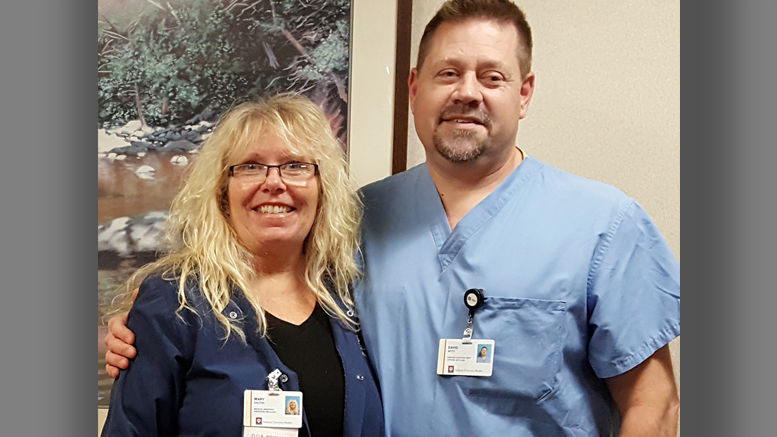By: Dawn Brand Fluhler—
Muncie, IN—March is National Kidney Month. According to the National Kidney Foundation, more than 100,000 people in the United States are currently waiting for a kidney transplant, but only about 17,000 people receive a kidney each year, and 12 people die each day waiting for a kidney.
A snowmobile accident in Michigan in 2007 left David Witty, radiologic technologist in the Cardiac Cath Lab for 26 years, in need of a kidney transplant. The accident caused a crushing type injury, from which he lost a foot of small intestine and was left with severely damaged kidneys. For 2 ½ years, he waited for a transplant as potential donors from his church were tested.
Organ donation is often labeled as the ultimate gift. Identifying one’s self as an organ donor on a driver’s license is one way to become a donor, but live kidney donation is also possible. Live donors are typically close relatives, but that isn’t always the case.
Mary Kay Dalton was exercising at the IU Health Ball Memorial Hospital Fitness Center with her friend (of 10 years or so) Angie, who is David’s wife, when she heard that he needed a kidney transplant. As a designated organ donor on her driver’s license, she knew that being a live donor was something she would consider.
Mary Kay talked it over with her husband, and with his support, she decided to do the testing necessary to find out if she was a match for David.
“You do have to go through a lot of testing and also counseling,” Mary Kay said. “It’s worth it. The surgeon stated I was a perfect piece to the puzzle. Praise The Lord.”
From there, she said, she left it in God’s hands and everything worked out great.
“I have known David and Angie for many years,” Mary Kay said. “I know David and his family loves me, and David is a very wonderful friend.”
Since donating her kidney to David, Mary Kay has had no related issues. And she believes that the decision to be an organ donor is up to each individual to consider. David calls organ donation “the most selfless thing you could do to change someone’s life.”
“Our friendship has definitely grown since the transplant,” David said. “I love my “special angel from God.” We joke with her family about me being an adopted member of their family.”
As a medical assistant in the Cancer Center for nearly 39 years, Mary Kay knows what goes into giving excellent, personalized health care.
“I cannot express how wonderful the people at IU Health in Indy that I worked with and the surgeon were, as were my family and friends,” she said. “I made the best decision – seeing David healthy, happy and enjoying his life is a wonderful gift. He was able to give his daughter away last year, and his son graduates this year, so I am glad he is here to enjoy that, and I wish him a wonderful future.”
David feels equally positive about the transplant experience and his dear friend.
“For me, being the recipient of Mary Kay’s gift, I’m very humbled and forever grateful,” he said. “Not only did she give me my life back, she gave my wife her husband and my children their dad back.”
Living donor medical expenses are usually covered by Medicare or the recipient’s health plan. Surgery is often performed as a minimally invasive procedure with a very small incision. The recuperation period is usually less than two weeks.
This was the case for Mary Kay. “My medical expenses were covered, and I was off for two weeks, took a few PTO days, and then had sick leave,” she said. “But I was ready to come back.”
For more information about becoming a live kidney donor, visit the National Kidney Foundation (NKF) website at kidney.org/livingdonation, or by contacting the NKF’s free, confidential helpline at 844.2BIGASK (844.224.4275) or bigask@kidney.org. If you want to talk to someone who’s already donated a kidney, NKF can also help.



